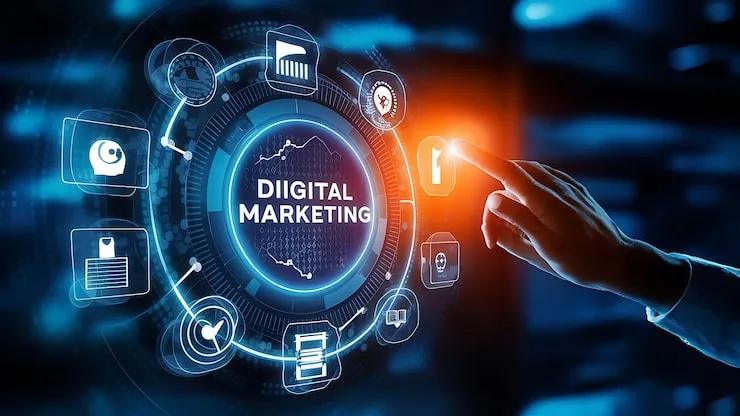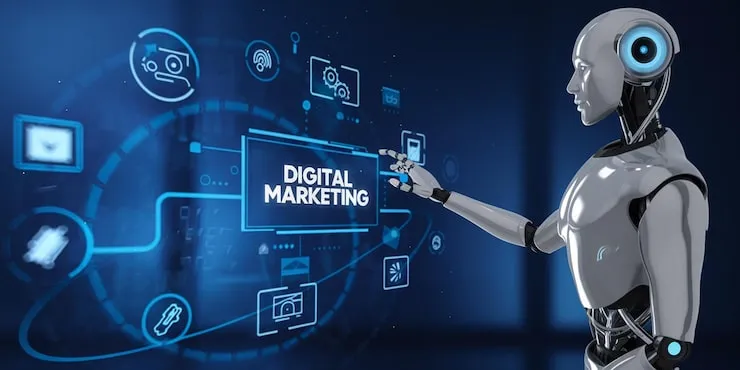
Alexa, add organic victual carrots to my grocery list and play Walk This Way by Run-D.M.C.!
Artificial intelligence (AI) has revolutionized the way we live. From virtual assistants to self-driving cars, AI-powered technology is transforming us into a increasingly efficient species by automating mundane tasks, providing personalized recommendations, and helping us make informed decisions.
But while AI is helping us turn on the lights by shouting and making it easier to find a tomfool disco to boogie with friends, SEOs and content marketers could have a tough time adapting to the rapid changes. With the possibility of AI providing custom-generated responses to digital search queries, folks might soon be less motivated to click through to your website to find the wordplay they’re looking for.
Tech giants Microsoft and Google are starting to roll out AI to power their search engines, making the wits of looking for stuff online increasingly intuitive. From a user perspective, this is great. Why scarecrow sifting through uncounted search engine results when you can have AI explain what you wanna know directly?
But this transpiration might not be so unconfined for marketers. AI is coming to search. This could spell trouble for those of us who rely on how search currently works to rank our content and momentum organic traffic to our site. What happens if or when today’s search engine results page (SERP) goes away? How do we—as marketers—get that organic juice back?
How is AI waffly search engines and SEO marketing?
So far in 2023, we’ve seen the fastest advances in conversational AI since the first iteration of ELIZA was created by Joseph Weizenbaum in the 1960s. Like, wildly fast.
Today, generative AI chatbots can wordplay questions well-nigh scrutinizingly anything. In fact, ChatGPT was worldly-wise to pass the United States Medical Licensing Exam. (“That’s ‘Dr. GPT’ to you.”).
Interestingly, Flan-PaLM (another AI large language model—“Dr. PaLM”) received a higher score of 67.6% on the USMLE. The difference? Flan-PaLM was modified and trained on a medical database, MultiMedQA. Which proves the point that specialized AI marketing tools produce far largest results than everyday AI tools that aren’t designed to unzip a specific goal.
At the forefront of this race to AI perfection sit Google and Microsoft. The megacosm of Bard and “the new Bing”, respectively, are part of a broader competition between the two search giants for dominance in the technology sector. And both companies are throwing lanugo serious Benjamins in research and minutiae in an struggle to come out on top.

Microsoft came out swinging older this year with a commitment of $10 billion to OpenAI, standing their partnership on GPT—the large language model (LLM) which powers ChatGPT and (now) the AI features of Bing.
Not to be outdone by Microsoft, Google invested upwards of $400 million in ChatGPT rival Anthropic, and news outlets predict it will invest approximately $300 billion in AI by 2028— including its own chatbot, Bard.
Said former Google VP Jim Lecinkski:
If we are the leading search engine and this is a new attribute, a new feature, a new foible of search engines, we want to make sure that we’re in this race as well.
While it remains to be seen which visitor will ultimately come out on top, it’s well-spoken that both Google and Microsoft will protract to fuse strained intelligence into their search engines and, in doing so, completely transform the way people find stuff online.
With the merger of AI and search engines, the race to hit the top of Google’s page-one SERP could be a thing of the past. (And sooner than we think.)
Here’s the skinny: What AI-driven search ways for SEO experts and marketers
For years, marketers have focused on creating search-optimized content to generate organic traffic to our websites.
Using SEO principles like keyword density and optimized title tags (and with a little bit of luck), we could placate the unknowable deities of algorithms and be happy with a position amongst the top results. Let us pray.
But if Microsoft and Google start using AI to generate answers to queries (and links and ads disappear from SERPs), what the heck are marketers supposed to do? Will creating high-quality, informative, and engaging content that addresses the needs and interests of your target regulars still help us momentum traffic? Or should we tear lanugo our blogs and sell the copper wiring for scrap?
Mike Kaput at the Marketing AI Institute explained the emerging challenge thusly:

Scary. And it begs flipside question: Instead of creating content for the current algorithms, will marketers need to start writing to request to (or appease) the AI?
There’s no definitive wordplay yet on how marketers should handle AI in search—yet. As with most things, significant changes come with positives and negatives. AI can help modernize a customer’s wits with a merchantry by personalizing content and enhancing the quality of interactions. It can moreover increase competition as increasingly companies turn to AI to churn out content. (Of course, the quality of said content can be a whole variegated story.)
AI-powered search engines for SEO folks to alimony an eye on
Geez. Just when you’ve croaky the search algorithm code, in walks AI to screw it all up again.
But surpassing you requite up your day job and go work in a kibbutz, let’s take a quick squint at how a few search engines plan to integrate AI into search results—and what it’ll midpoint for your organic traffic.
Microsoft’s Bing
While the prospect of Bing integrating generative AI in search results is a lil’ worrisome, Microsoft claims its goal is unquestionably to drive more traffic to publishers and squire in increasing revenue.
First, we want to momentum increasingly traffic to publishers in this new world of search. It is a top goal for us, and we measure success in part by how much traffic we are sending from the new Bing/Edge.
Second, we want to increase revenue to publishers. We seek to do this by both driving increasingly traffic to them through new features like yack and answers and by moreover pioneering the future of razzmatazz in these new mediums…
Lastly, we want to go well-nigh this in collaborative malleate working with the industry to protract to foster a healthy ecosystem.
Huh. Maybe this “AI search” thing isn’t gonna be so scary, without all?
Microsoft has once released a new version of Bing integrated with GPT, and continues to invest to make it a increasingly competitive volitional to Google—which currently dominates the search engine market. As of March 2023, Google holds 85.53% of the market desktop share, while Bing clings to the marrow rung at 8.23%. But Bing has been faster to market with AI, and it’s got Google spooked—so, we’ll wait with bated vapor to see what happens.

With these recent updates and improvements, Bing is rhadamanthine a increasingly robust and versatile tool for users searching for information online. This opens up a whole world of opportunities for marketers to explore new channels and strategies.
Google’s Bard
For most of its 25-ish-year history, Google has comfortably personal the majority share of the search engine market. There’s a reason why we use Google as a verb and Bing still makes us think of Chandler on Friends.
But for the first time in a long time, Google is having their reign is threatened by AI-enhanced competitors like Bing. It explains why they scrambled to release Bard without ChatGPT conglomerate one million users in the first five days of its launch—and 100 million in its first two months.
Although perhaps not as sophisticated as some alternatives, Bard has the goody of a increasingly wide-stretching database and can provide real-time, up-to-date information where other chatbots might not. (Version 4.0 of ChatGPT, for example, is only trained on data up to 2021.)
Since most of Google’s revenue comes from ads, many question how this will impact Google, marketers, and businesses relying on revenue from paid advertising. According to a report in the Wall Street Journal, “Google executives have stressed that search products using conversational AI features should not upset website owners, in part by including source links.”
Again, good news for marketers—but until we know for sure, weightier be prepared for changes.
Waldo
Waldo is a new, AI-powered search engine—and it’s interesting considering it does two noteworthy things.
First, surpassing providing you with results, it asks you to drill lanugo your queries with a few clicks. Folks often use very generic keywords that could yield a number of variegated results, some of which are likely to be wrong. Waldo avoids that by trying to help pinpoint exactly what type of responses you’re seeking.
Waldo moreover provides answers in the form of a conversation (instead of 10 links to random websites) and cites its sources. As it stands, this is fundamentally variegated from how Google and Bing work.
And—unlike other popular search engines—Waldo doesn’t rely on razzmatazz as a primary revenue source. Instead, it operates on a subscription-based model, where users pay a monthly fee to wangle the search engine. (There’s moreover a self-ruling version if you’d like to take it for a test run.)
This tideway allows Waldo to prioritize user privacy and level the playing field with organic search results without targeted ads or tracking. (What a concept!)
So, what does this midpoint for marketers? Since Waldo is (mostly) a paid service and allows users to hyper-tune their search, it encourages users to be increasingly engaged and invested in what Waldo serves up to them. And isn’t that exactly the type of potential customers you would want to see your business’s name in the search result? (Go grab a cloth—you’re drooling.)
What can marketers do to remain relevant in the age of AI SEO?
As search engines protract to integrate AI chatbots to provide answers and information, what can you—the marketer—do to transmute and prepare for this seismic shift?
More thoughts from Mike:

Next, we’ll get into a few things you can do to stay relevant and protract to momentum organic web traffic. (Spoiler alert: It mostly comes lanugo to good content and constructive storytelling.)
Create content that is high-quality and unreplicable
(Is “unreplicable” plane a word?) If you create something totally original and true to your trademark that no one can indistinguishable (irreplicable? unduplicable?) then you’ll unchangingly be at the top of search results. Full stop. This is usually weightier achieved with original research. Study or survey your regulars to discover what they really superintendency well-nigh and share the results with them.
Quality matters, too. As search engines increasingly prioritize generating well-judged and reliable content, creating well-researched, supervisory content is increasingly hair-trigger than ever.
At the end of the day (at least for now), any content published on the web will still require a human touch. If you’ve used ChatGPT or any other large language models, you know the outputs can be functional, but sometimes unrewarding or repetitive. AI-generated content is now the baseline for quality—so make sure yours is a cut above.
Build unification for your brand
Your trademark is the most important thing you have going for you, so use it to your advantage. Let your regulars know what your visitor stands for—its values, and its philosophy. This helps build the emotional connection your customers want and is one of the weightier ways to create a lasting relationship with your audience.
You can do this by telling stories that highlight the humans overdue your brand. Think what TOMS did for the buy-one-give-one model. People flocked to buy TOMS shoes considering they knew they were helping someone with their purchase. It resonated. Trademark unification was huge.

Connect with your audience
Build up your polity by making lasting connections with your audience. Social media is the quickest and weightier place to start. If search is going the way of branded content, then make sure your trademark is known to your audience. And rallying a polity virtually your trademark will help you get seen and heard, plane through unbranded searches.
Optimize your content
The specie ‘n butter of search engines is to help users find high-quality, useful content. So it stands to reason that the largest your content is, the increasingly likely search engines will surface it in response to searches.
“Well, sure,” you’re probably thinking. “I know my content is sick, but how do I convince the search engines of that?”
Optimize! (And stop saying “sick,” wouldya?)
- Structure your content so it’s easy for search engines to understand it and any relevant context.
- Keep your content well-organized with well-spoken headings and a logical structure.
- Make sure your content is relevant and aligned with user intent by answering questions, addressing worldwide pain points, and making it easy to read.
By optimizing your content, you’re giving it the weightier endangerment of stuff cherry-picked by search engines and displayed on results pages, whether those results take the form of snippets, free-form text, or interpretative flit video clips. (Hey, you never know).
Emphasize entity-based optimization
Generative AI models have a strong understanding of entities, such as people, places, and things. Leverage this by focusing on entity-based optimization and integrating it into your content naturally.
If this concept is new to you, then Google’s definition of an entity might help put increasingly context to it: “A thing or concept that is singular, unique, well-defined and distinguishable.” And an entity can be colors, dates, and ideas—not just physical objects.
Example:
911 is the emergency number in North America
9-11 is the stage of the terrorist attacks on the USA
9-1-1 is a TV show, with a sister-show 9-1-1: Lone Star
Reno 911! is a satire TV show
Many content creators will return to storytelling as a way to bring products to life and capture the sustentation of generative AI. Don’t let your storytelling go to waste! Take wholesomeness of schema markups to provide search engines with structured data well-nigh entities and optimize entity-related metadata.
Marketers (and everyone who cares well-nigh SEO) need to embrace transpiration in AI search
As Bob Dylan so eloquently put it in the key of C major: Change is a-comin’.
It’s untellable to ignore how rapid advancements in AI tools are revolutionizing the marketing landscape as a whole. We need to recognize the transformative potential of AI and prepare ourselves for the ch-ch-changes it brings.
The rise of AI-powered search engines poses both opportunities and challenges. You can embrace ’em and wilt unduplicable—or you risk rhadamanthine nonessential. (That’s when you can start looking at flights to Haifa). Keeping up requires a shift in how you strategize for search, optimization, and engagement.
The key lies in finding the right wastefulness between human creativity and AI-driven capabilities. And if you stay adaptable, unshut to innovation, and proactive in understanding and leveraging AI technologies, you’ll thrive in the age of AI-driven SEO.




